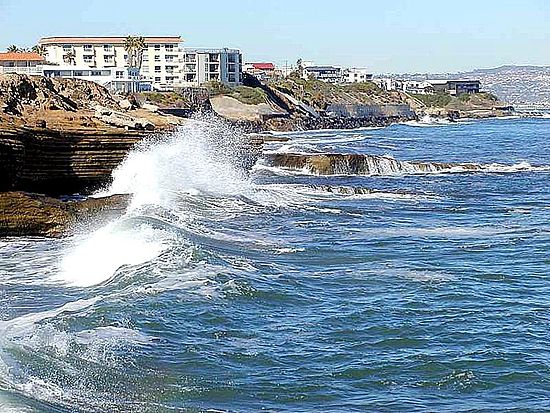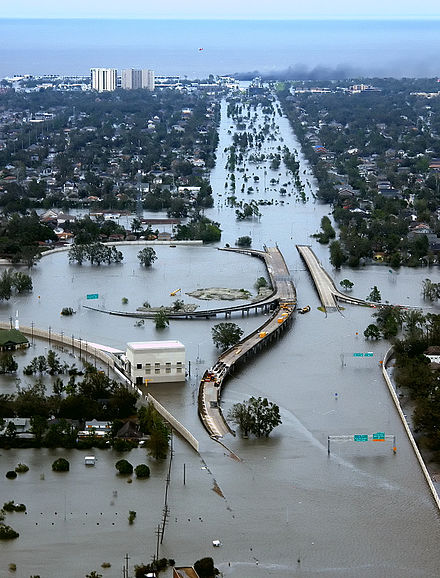Rising Seas Swamping Coastal Real Estate Markets
Category: Retirement Real Estate
Dec. 7, 2016 — The ultimate dream for many a baby boomer is to buy a home on the edge of the sea. Brilliant sunrises, grandkids playing in the sand or swimming off the fishing dock, and fiery sunsets are all part of that dream. Unfortunately, the reality of rising seas is threatening that good life. A recent article in the NY Times, “Perils of Climate Change Swamp Coastal Real Estate“, found that real estate prices in flood prone areas of the U.S. are either declining, or not rising as fast as in other parts of the country.

It used to be that potential buyers of coastal property didn’t investigate too carefully, as long as the view was good and the water near. But too many hurricanes and floods have led to cautious buyers. Flood insurance, long subsidized, is getting more realistic and a lot pricier. Potential buyers, lenders, and insurance companies are insisting to know about flood zones, storm surges, pumps, emergency power, and the like. Another concern is that taxes on waterfront property can be enormous compared to inland areas. When buyers they don’t get good answers, they often move on to safer properties.
The Times reported that home sales in areas prone to flooding are down over the past five years, growing “…about 25 percent less quickly than in counties that do not typically flood, according to county-by-county data from Attom Data Solutions, the parent company of RealtyTrac.” Some experts predict that a coming waterfront real estate bust could make the 2008 collapse look like nothing. Sean Becketti, the chief economist for Freddie Mac, warns that “it is only a matter of time” before homeowners abandon their dreams along the water, leaving lenders to pick up the pieces.
The problem is everywhere
Almost every coast is problematic, but the southeast U.S. has some of the worst issues. Almost all of Florida’s coast is low, with high tides flooding more and more areas routinely. The same goes for the Carolinas and the Gulf Coast. In the Florida Keys almost every home is at risk, particularly from storm surges and king tides where water actually comes in from the porous rock underneath.
What to do
Obviously, think carefully before you buy anywhere near the coast – oceanfront, bayside, or even miles inland. Consider these issues before you buy:
– Check out flood and wind insurance – and know that rates are only going up
– Review FEMA maps and past flooding records
– Talk with local coastal experts about what is happening
– Review what kind of protection your home might have – emergency power, protective dunes or seawalls, hurricane rated doors and windows
– Consider if your real estate investment would be more solid if you buy on higher ground.
More detailed advice
Climate Change and Where You Retire: Should You Be Worried
And if you must live near the Coast: Affordable Place to Live Along the Waterfront
Comments? Have you dreamed of living along a coast in your retirement? What kind of issues have you encountered if you live their already? Any advice for folks who just have to live along the water.







Comments on "Rising Seas Swamping Coastal Real Estate Markets"
LS says:
I can attest to what is stated in this article. We bought a condo in Galveston at a new beach resort in 2006. We had vacationed at beach house rentals for years and thought it would be a good investment for appreciation and rental income. It was good income for a while and we could depreciate the furnishings as a business expense so that helped on our taxes. However, after Hurricane Ike caused much destruction in Galveston, insurance rates greatly increased, our builder went bankrupt and the housing market went into a tailspin that has not yet recovered for beach property on our island. In addition, many communities are starting to place more restrictions on vacation rentals and charging registration fees. The vacation rental listing websites are now basically owned by one company and they can now charge excessive fees for listing your property. We stopped renting our condo and have been trying to sell it for 2 years. We are going to take a bath on it and probably loose $150k. I don't know if climate change is impacting property values in Galveston or not. But I will never buy beach property again. If you want water views, get a lake lot and save yourself some money.
Ron says:
I can attest to the reality of this article ! My retirement plans were to move t o the coast. Reality set in when I investigated 1) Global Warming and 2) Insurance costs. Both are reality.. Sorry you deniers.
Coastal areas in North and South Carolina and Georgia are astronomical. This year the hurricane that hit North Carolina showed t hat even 20 miles or more inland are prone to sustained flooding.
Best go to Google Earth and check out the elevation of property before considering a move in that direction.
Moderator Flo says:
I had some trouble finding the Google map mentioned above, but found this site which shows elevation in feet when you type in an area or a specific address.
Hope it helps!!
https://www.freemaptools.com/elevation-finder.htm
Linda says:
Check the flood plain maps in your potential community before you buy. I was careful to buy in an area which does not require flood insurance. I didn't buy this for an investment; I'm living here. So I don't care as much about property values, although they are still rising here.
Jack says:
All true. We loved Charleston, SC. Has everything we wanted, academic community, great restaurants, great medical facilities, great docs, excellent golf. Checked Sullivan's Island, Isle of Palms, Daniel Island, etc etc. ergo we moved to Summerville, SC-- 20 miles inland and 20 minutes from downtown.
Barbara says:
Flo, thank you sor the link to freemaptools. That's fantastic! I quickly checked all the locations I was considering.
SandyZ says:
If you are thinking about the Lowcountry of SC, ask if the spot you have fallen in love with is a Barrier Island or not - makes a huge difference! The barrier islands of Hilton Head, Fripp, Hunting Island etc. took the brunt of Hurricane Matthew. Islands more protected sustained wind damage, trees down, but nothing like barrier islands in SC.
Moderator Flo says:
Barbara
Glad you found the map helpful. It's an interesting tool, but I believe a property needs to have an elevation study done professionally when applying for FEMA flood insurance so you may want to keep that in mind. I wouldn't take the chance not to apply for flood insurance based on a website map.
Kevin says:
Interesting...I've lived by the sea for more than 25 years now and haven't seen any change at all.
Dick says:
Ron, how can you attest to anything when you don't even live by the coast. You are wrong on both cases. I live in coastal North Carolina and my homeowners insurance is NOT astronomical, $1900/year for property worth $350,000. Any flooding 20 miles inland during the hurricane was not caused by the ocean but by the tremendous amount of rain causing the rivers to overflow. I agree with Kevin, haven't seen any change in the 26 years I have lived here.
Ron says:
Dick,
we lived in Boca Raton FL 1 mile from the beach and p[aid over 5000 annually just in hurricane insurance. Please do not try to lessen the impact of Global Warming and the damage insurance companies expect to happen.
Flood insurance can rise by 25% per year until the insurance companies determine the actual impact of this devastating climate change.
I don't know how close you live to the beach but the closer the higher especially if you are in a flood plain. The flood damage you referred to "Rain" resulted in a huge number of homes damaged and most did not have flood insurance so that area will be seeing increased rates as well.
The point is if you are considering a move in that direction make sure you nail down all of these additional costs before you sign!
Florence says:
Can other coast dwellers chime in? It would be interesting to hear what you've been seeing over the years.
DeyErmand says:
I work for FEMA during the Hurricanes and Tornadoes. Please check with the City of your destination for preparations.
See how Flood prepared they are, and get a flood map for that city. The first concern is storm surge, and dwelling sturdiness. How well will your home take the winds? rising waters and fallen trees? Will you be able to go without electric and boil water if need be for days on end?
FEMA recommends that you:
Know Your Risk from flooding;
Know Your Role when it comes to keeping safe from and reducing flood risk; and
Take Action to reduce your risk from flooding.
** if I have to choose between living in a Hurricane Area or a Tornado Alley, I would choose the Hurricane Area over a Tornado dropping out of the sky with little warning. My plans are to retire inland of the coast away from Zone 1's.
Colorado Living says:
Ron,
Don't get so worked up over something you can't control. Live your life the best you can and help others. Don't impose your will or opinion on everyone. The sky is not falling and the sun will surely rise. Of course, it doesn't hurt be be cautious. DeyErmand's point, be prepared for the higher probability big stuff. Me, I'm still looking for that perfect place for my last days.
Find what gives you joy in your life. You might live longer doing so.
Staci says:
Someone asked earlier was about the changes seen along the coast. Can anybody give some input on that?
David says:
Give me the warmth of the sun and longer growing seasons and take away all of this snow i see parked on my back lawn. The reason I joined this site is because we plan on going where its warm in 12 -18 months. Bring on the warmth!
SandyZ says:
Staci- what information are you looking for? Hurricane damage? Effects of climate change? Construction and physical changes? If you are more specific, you may get more informative responses. I lived on the Maine coast for 33 years and now live on the SC coast - what coastal areas are you interested in?
jacci says:
SandyZ, we are here in Myrtle Beach for 10 days checking it out for possible move in a year or so. We do love it! Well, maybe not so much Myrtle Beach, but the area!! People are friendly, veterans can hold onto honor, people wish you a Merry Christmas!, no snow! can leave window open at night for air without freezing! We seem to like Little River and Conway (outside city limits). They seem close but far enough. Any thoughts on those areas? or somewhere you think better? I'd rather not pay exorbitant flood/hurricane insurance. We are leaning toward condo life so no outside work! If I had the money, would LOVE Cherry Grove Beach!! Thanks in advance!! jacci
Staci says:
SandyZ and others
A lot of SC is considered "low country" with good reason. Have you seen an increase in costal flooding due to tides, rain, etc.? I know last October a combination of rain and I believe, king tides, caused extensive flooding in the Charleston area. Have you seen an increase in those sort of things. We all hear about the hurricanes but lesser things, not so much.
Thanks
Alice says:
Staci - in a word, yes. Increased flooding is due to sinking land levels, rising sea levels and extensive building on what was once wetlands, or land that was meant to act as a sponge but no longer can because something now sits upon it. (think of Joni Mitchell's old song paved paradise). Barrier islands continue to erode (everywhere) but I think the 'tide' has finally turned on the idea that these are a great place to put up homes. They never were meant to be a stable structure, so I'm glad that there is much litigation going on (Kiawah for example) with developers who want to keep on building vs. those with any common sense. Finally, a friendly reminder, hurricane paths do not follow the same route. Being spared from hurricane Matthew in no way indicates that you will be spared from the next one. Regarding your exact location (barrier island vs a few miles inland), the winds from Hurricane Hugo were felt as far away as Aiken.
DeyErmand says:
I hope this helps those who check out the evacuation zones when checking out coastal towns and surrounding areas.
Evacuation Zone Storm Surge Category Storm Surge in Feet
A 1 7?12
B 2 12?15
C 3 15?20
D 4 20?25
E 5 25+
DeyErmand says:
Well that didn't copy and paste well!
Evacuation Zones are letters, Storm Surge Categories are numbers, and Storm surges in feet are 7-12, 12-15, 15-20, 20-25 and 25+
Staci says:
Thanks DeyErmand
I'm assuming the lower the letter and numbers the better.
DeyErmand says:
Staci. Actually NO. The Evacuation Zones A being the First to be evacuated from- Hurricane Impact. Where as Storm Surge areas 1- least flooding. Remember this, "hide" from the wind, but "run" from the water. Some areas on the coast in A-E Zone doesn't even get a surge number, just an evacuation letter. Insurance providers determine prices more by flooding then wind. Get a Flood Zone map before moving and hire your own home inspector before buying a place.
SandyZ says:
Best advice DeyErmand! Do NOT think you are spared from high tides and storm surge by living up north - even in Maine, we lost our beach front, retaining walls, and roadways along the beach over and over again. One of our most beautiful beaches, Goose Rocks Beach, in KPort is eroding at a fierce rate and reclaiming land very close to cottages. Respect Mother Nature - she means business! On the flip side, tornados are very prevalent inland, and earthquakes can happen everywhere - so be cautious, be aware, follow the advice for due diligence up front, BUT go where you heart calls "home"!
DeyErmand says:
Mother nature has a very emotional twist! I consider 30-60 miles inland, elevation around 300 FT much safer, as that is the rule of thumb that FEMA uses to keep us workers out of "danger" while we wait the storm out before rescues. Yes, home to one, isn't home to another. And I have seen die hard home bodies!
Staci says:
Think I'll investigate lake front living and drive to the beach!
areti11 says:
I guess that's one reason you can purchase a condo on the beach for $ 100,000 on the coast of oregon.